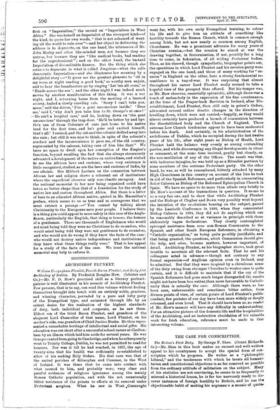ARCHBISHOP PLUNKET.
William Conynghani Plunket, Fourth Baron Plunket, and Sixty-first Archbishop of Dublin. By Frederick Douglas How. (Isbistet and Co.)—Mr. F. D. How's practised skill as a literary portrait- painter is well illustrated in his memoir of Archbishop Plunket. Few persons, that is to say, can read this volume without feeling themselves brought into touch with an entirely noble, gracious, and winning character, pervaded by a pure and lofty piety of the Evangelical type, and animated through life by an ardent desire for the realisation of the highest standards of duty, both individual and corporate, as he saw them. Eldest son of the third Baron Plunket, and grandson of the eloquent Lord Chancellor of that name, Lord Plunket, on his mother's side, was grandSon of Chief Justice Bushe. He thus repre- sented a remarkable heritage of intellectual and social gifts. His education was cut short after a successful school career at Chelten- ham by an illness which laid him aside for several years. He was thus pre vented from going to Cambridge, and when he subsequently went to Trinity College, Dublin, he was not permitted to read for honours. Nor was it till he had reached, in 1857, the age of twenty-nine that his health was sufficiently re-established to allow of his seeking Holy Orders. His first cure was that of the united parishes of Kilmoylan and Cummer, in the West of Ireland. It was there that • he came into contact with what seemed to him, and probably were, very clear and painful evidences of religious ignorance among the mainly Roman Catholic population, and with the not unnaturally bitter resistance of the priests to efforts at its removal under Protestant auspices. What he saw in West aConnaught
went far, with his own early Evangelical training, to colour his life and to give him an attitude of solnething. like hostility towards the 'Roman Church, which is common enough among Irish, but not now nearly so common among English, Churchmen. He was a prominent advocate for many years of
Christian reunion,—but the reunion he aimed at was the drawing together, in fraternisation, if not, possibly for a long time to come, in federation, of all willing Protestant bodies. Thus, as his shrewd, though sympathetic, biographer points out, the operations in which Lord Plunket and his reunion party were engaged on the one hand, and those of many working for " re. union " in England on the other, bore a strong fundamental-re- semblance to a tug-of-war. It was surprising that almost throughout his career Lord Plunket really seemed to take a
hopeful view of the prospect thus offered. But his temper was,
as Mr. How observes, essentially optimistic, although there was a touch of melancholy in the expression of his fine countenance.
At the time of the Prayer-book Revision in Ireland, after Dis- establishment, Lord Plunket, then still only in priest's Orders, advocated several rather drastic changes in the direction of levelling down, which were not carried,—happily, as they would almost certainly have produced a breach of communion between the disestablished body and the Church of England. These extreme Low Church tendencies appear to have been moderated
before his death. And certainly, in his administration of the archdiocese of Dublin, which he occupied during the last twelve years of his life, after eight years as Bishop of Meath, Lord Plunket held the balance very evenly as among contending parties, and while discouraging any illegal developments in ritual or ornament, at the same time insisted, gently but clearly,-on the non-mutilation of any of the Offices. The result was that, with ludicrous injustice, he was held up as a Ritualist partisan by some members of the extreme Protestant party. On the other hand, he was, as will be remembered, bitterly attacked by many High Churchmen in this country on account of the line he took in aid of the Spanish Reformers, and particularly in consecrating Sella Cabrera as Bishop of the Reformed Episcopalian Church in Spain. We have no space to do more than allude very briefly to Mr. How's account of the transactions in question. It seems to us a very fair one, and to show that while Archbishop Plunket and the Bishops of Clogher and Down very possibly went beyond the intention of the resolutions bearing on the subject, passed by the Lambeth Conference in 1888, when they consecrated Bishop Cabrera in 1894, they did not do anything which can be reasonably described as at variance in principle with those elaborately vague declarations. They clearly contemplated episcopal assistance from some non-Roman Communion to the Spanish and other South European Reformers, in obtaining a "Catholic organisation," as being quite possibly justifiable, and that being granted, the questions, which Communion should give the help, and when, became matters, however important, of detail. Archbishop Plunket, as his biographer shows, took great trouble to ascertain all the relevant facts. That he and his colleagues acted in advance — though not contrary to any formal expression—of Anglican opinion even in Ireland, may be admitted. But that they were inspired by a chivalrous sense of the duty owing from stronger Churches to weaker ones is quite certain, and it is difficult to maintain that if the cry of the Spanish Reformers had gone much longer disregarded the results might not have been less rather,than more favourable to Catholic unity than is actually the case. Although there were, as has been seen, unfavourable and sometimes bitter critics, from diverse points of view, of certain points of Lord Plunket's public conduct, few prelates of our day have been more widely or deeply esteemed, and even loved. That it should have been so, no reader of Mr. How's memoir will have any difficulty in understanding. For an attractive picture of the domestic life and the hospitalities of the Archbishop, and an instructive elucidation of his valuable work for Irish education, reference must be made to that interesting volume.






















































 Previous page
Previous page